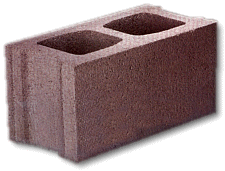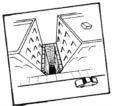 Fleetwood Building Block • (610) 944-8385 • Fax: (610) 944-0827 |
 Fleetwood Building Block • (610) 944-8385 • Fax: (610) 944-0827 |
 |
Nothing Compares with the quality of a concrete block foundation. Here are the reasons why… |
 |
1. Construction
Time Concrete masonry block offers the fastest way to construct a basement. Most block foundations can be completed and back filled in just a couple of days. By contrast a poured foundation should not be backfilled for several days to avoid cracking. Time is Money. Your bank is keeping close track of its investment; you should too. |
 |
2. Cost Our findings show that masonry block basements can be up to 15% less to build than comparably sized poured basements. Savings may vary, but one fact remains; money NOT spent on your basement can be used to upgrade carpet, cabinets or even build a fireplace. |
| 3. Energy
Efficiency A typical masonry block foundation has more than twice the R-value of a poured foundation, saving you even more money when it’s time to insulate. The top of a block wall is also much straighter and more level than a poured wall, so air leaks are almost eliminated. The hollow spaces in a block wall also help keep water condensation away from the inside of wall surfaces. That’s a real plus when you insulate because insulation works better when it’s dry. Poured walls have no choice but to "sweat", which wets insulation. That can be a real problem. |
|
 |
4. Higher Strength Poured wall field practices, like adding water to the mix, greatly reduces the strength by increasing the size and frequency of cracks in poured walls. A standard concrete block wall has gauranteed built-in strength, block after block. And the block used in large commercial buildings are the same type used in your foundation wall. There is no down grading of product used to build your block basement. |
 |
5. Construction Flexibility When building a concrete masonry foundation, a mason can stop anywhere, at any time, to make custom changes, like moving a door or enlarging a window, without affecting the quality of the job. Once pouring a wall has started, there’s no stopping until the forms are filled. Also, block is perfectly suited for building basements in tight spots, between existing structures for example, where concrete trucks cannot gain access. With concrete block it’s easier to increase the ceiling height by simply adding another course or two of block. To do the same with poured walls, extra form work and bracing is needed, which increases costs. |
 |
6. Waterproofing A leaky basement is usually caused by a poorly drained site or faulty drain tile installation. A block foundation is waterproofed by backplastering or applying a cement based coating. Poured walls are usually sprayed with a thin asphalt paint. Block walls are waterproofed; poured walls usually are not. |
| 7. Repairability In the event a masonry block wall cracks, repairs are readily made using regular mortar. When a poured wall cracks, not only does it lose strength, but also requires a complex set of steps and materials are followed for repair success. |
|
 |
8. All Weather Construction Provided the soil under the wall is not frozen, a masonry block wall can be constructed in any temperature, any weather. Block basements are dramatically less susceptible to the effects of freezing than poured walls. Remember, the entire poured wall must cure in the field. Only the mortar in between the dry blocks must field cure. |
| 9. Ease of Remodeling By using precolored, prefinished block, the need to fur-out and sheet rock can be eliminated. Even a plain grey block wall looks great with just a coat of paint. Typically, poured walls need furring and sheet rock to look as good as concrete block. What it comes down to is that prefinished, painted or furred and sheet rocked block walls are easier to construct and less expensive than poured basements. That’s something to consider when you’re thinking about adding more living space. |
|
 |
10. Rational Choices Now that you know the facts, the choice is clear. Concrete block is the only building material an informed person can use to build their basement. Concrete masonry is truly the only logical choice in building materials on the market today. |
| When you compare concrete masonry block basements with other foundation systems you
will find concrete masonry block basements SAVE
$$ SAVE $$ SAVE $$ SAVE $$ SAVE $$ |
| More Gray Block |
Copyright © 2012, Fleetwood Building Block Inc. All Rights Reserved. Copy and/or distribution in any form is strictly prohibited. |